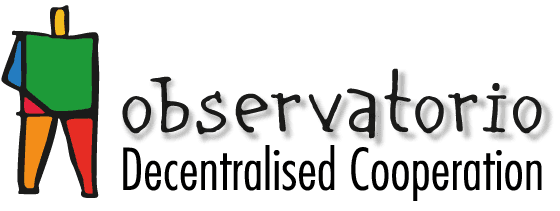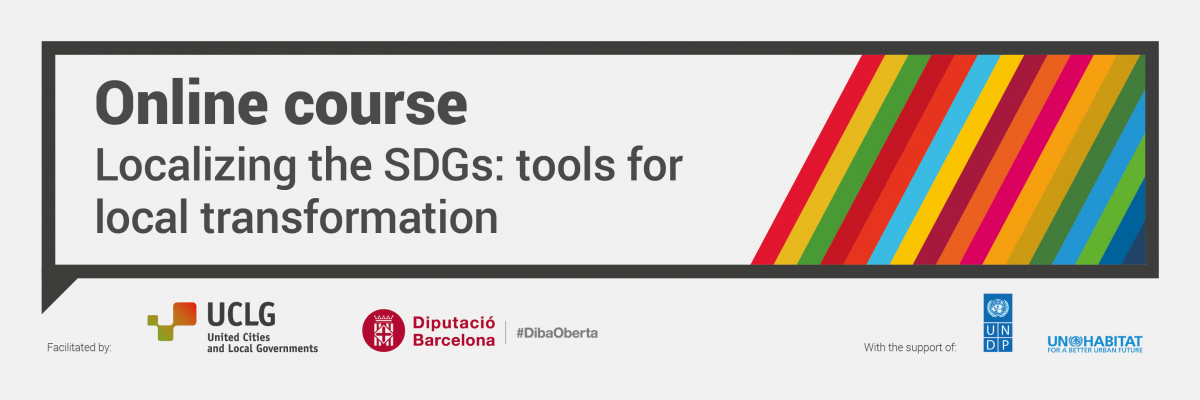The global pandemic caused by the COVID-19 has strongly impacted most of the countries of the world. It is causing serious consequences and setting new challenges difficult to achieve for all levels of administrations: national, regional and -particularly- local. In fact, these challenges were already included in the 2030 Agenda and its Sustainable Development Goals (SDGs). Now it has been exposed that achieving the SDG is the key to preserving our planet and guarantying the well-being of the entire population.
The world organization United Cities and Local Governments (UCLG) and the Barcelona Provincial Council, through the Observatory for Decentralized Cooperation and UCLG Learning, are launching an online training under the name "Localizing the Sustainable Development Goals (SDGs): Tools for Local Transformation".
The 2030 Agenda provides a stable framework to guide the recovery process after the crisis, and thus be able to preserve the health and well-being of the population -while protecting the environment- with ambitious objectives guided by the principles of solidarity and cooperation.
In this sense, the course aims to train and provide tools for local and regional governments (LRGs) and their associations to implement and adapt the SDGs at the local level, a process known as "localizing the SDGs".
In order to enable the participation of as many countries as possible, the course will be available in three languages: Spanish, English and French. This entails a greater diversity of visions and experiences that can only enrich the training.
This training is based on the road map developed by the Global Taskforce of Local and Regional Governments, UNDP-Art and UN-Habitat, to assist local and regional governments in formulating national policies to create an enabling environment for action at the national, local and regional levels.
Course objectives:
By the end of the course, participants will be able to conduct SDG-compliant policies and align their municipal or regional action plans with the 2030 Agenda. Thanks to the theoretical foundations and the applied experience, the following skills are sought:
- Identify new international challenges and challenges facing local and regional governments;
- Ensure ownership of the 2030 Agenda by local and regional governments around the world;
- Identify the benefits of localizing the SDGs;
- Internalize the leadership culture of local and regional governments to achieve the 2030 Agenda and the SDGs;
- Gain knowledge in the managing of initiatives and instruments for localizing the SDGs: planning tools, advocacy tools, project implementation tools and monitoring and evaluation tools;
- Share different real life experiences of localizing the SDGs;
- Contribute to strengthening the global alliance for sustainable development.
Syllabus:
Chapter 1: Introduction to the Sustainable Development Goals (SDGs)
Chapter 2: Awareness raising, advocacy and dialogue for the localization of the SDGs
Chapter 3: Localizing the SDGs. Aligning local and regional development plans
Chapter 4: Preparation of the National and Local Voluntary Reports on the SDGs
Methodology:
The training is designed taking into account that the profile of the participants is entirely that of people who have a professional activity. It is not mandatory to be connected to the Campus at specific times, so each participant may adapt the schedules of the activities to their own agenda.
Furthermore, this online course is clearly designed to be practical. Accordingly, there is a strong bias towards activities, most notably those that generate a substantive debate and interaction between the participants. The aim is that the participants' own experience operates as a pillar on which the training is structured. This combination makes it possible to delve deeper into the content through critical analysis, while encouraging the application of concepts and tools.
Before starting the training as such, the course includes a Module 0 that introduces students to the dynamics and strategies of online training. This enables them to get acquainted with the virtual work environment and its main tools for communication and interaction with the group. Likewise, there will be a teacher and a reference tutor to walk the group through the course materials and activities associated with each subject.
Admission criteria:
A total of 35 places are offered for each of the three language modalities. The course carries no cost for participants since it is fully funded by the Barcelona Provincial Council and UCLG.
Any person, regardless of nationality and whose professional activity consists of managing public development policies in any country may enroll in the course. Once all applications have been received, the Evaluation Panel will review the different profiles and decide who are the 35 individuals selected for each of the three modalities. The selection process will take into account the adjustment to the target audience profile described above and it will attempt to ensure a balanced composition of the group with as many different countries as possible. All course registrants will receive an email at the end of the process informing them if they have been selected or not.
The training will take place over 3 months and will have a total duration equivalent to 63 teaching hours.
Key dates:
September 6, 2020: End of registration period
September 17, 2020: Beginning of the course
December 22, 2020: Course completion
Contact: ocd.bcn@diba.cat / learning@uclg.org








